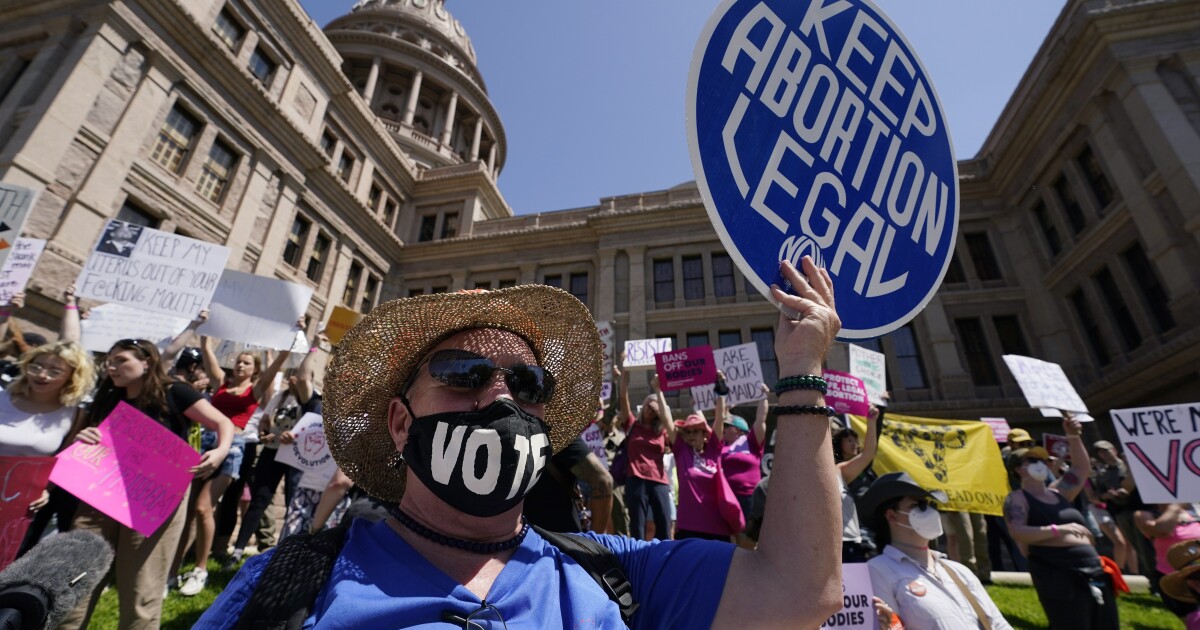

At least 13 states had so-called trigger laws on the books to ban abortion as soon as the Supreme Court relegated jurisdiction over the social issue back to them, which the high court did on Friday.
Specifics of the bans vary from state to state, with some immediately going into effect and others waiting on some type of certification. Eight of the states with trigger laws do not appear to have exceptions for either rape or incest, and the timing of when the bans would be “triggered” varies by state. As of press time, at least six of these bans have been enacted following the Dobbs v. Jackson Women’s Health Organization decision Friday that overturned Roe v. Wade.
Here’s a look at the states with trigger laws:
WHITE HOUSE SAYS IF ROE IS OVERTURNED, ‘WE WILL NEED CONGRESS’ TO RESTORE IT
Arkansas — after certification, no clear exemptions for rape or incest
In 2019, Gov. Asa Hutchinson (R) signed a trigger law into effect banning abortion in all instances, except for medical emergencies, after the state attorney general determines the precedents first established in Roe are overturned. The law imposes up to a $100,000 fine and/or up to 10 years in prison for providers who violate the measure.
The trigger ban was activated Friday.
Idaho — days after Roe is scrapped, exemptions for rape and incest
The Gem State has a trigger law slated to go into effect about 30 days after Roe is overturned that would ban abortion, except in the case of preventing the death of a pregnant woman, rape, or incest. Medical professionals who violate the law will face a minimum of two years behind bars as well as a temporary suspension of their license on the first offense and permanent revocation on the second, per the Spokesman-Review.
Kentucky — immediate, no clear exemptions for rape or incest
Despite power in the Bluegrass State state being divided between Democratic Gov. Andy Beshear and the Republican-controlled state legislature, the state already has a trigger law on the books. Prior to Beshear’s ascension to the governor’s mansion, the state enacted a trigger ban in 2019, rendering abortion a felony offense except for instances of a threat of serious injury or death to the mother. The measure took place immediately after the reversal of Roe. Medical providers who violate the law could get slapped with a class D felony, which entails up to five years behind bars.
The law went into effect Friday.
Louisiana — immediate, no clear exemptions for rape or incest
Enacted in 2006, the Pelican State’s trigger ban would ban abortions immediately after Roe is nixed, with an exception for instances in which the woman’s life is in danger, according to the Guttmacher Institute, an abortion rights advocacy group. The law would penalize abortion providers with a fine between $10,000 and $100,000 and up to 10 years in prison, per Guttmacher.
The state automatically enacted the ban Friday.
Mississippi — after certification, exemption for rape, but not incest
The Magnolia State implemented its trigger law in 2007, according to Guttmacher. An abortion ban goes into effect about 10 days after the state attorney confirms Roe has been scrapped and levies a felony charge of up to 10 years in prison against medical providers who flout the law. Exemptions include instances of rape and danger to the life of the mother.
Missouri — after certification, no clear exemption for rape or incest
In 2019, Missouri implemented its trigger law, banning abortion with an exception for instances of medical emergencies. The ban will go into effect after the state attorney general certifies Roe was overturned. Medical professionals who breach the law could get charged with a class B felony, which includes sentencing that ranges from five to 15 years in jail, STLPR reported. Violators could also have their medical licenses revoked.
Missouri Attorney General Eric Schmitt initiated the ban Friday.
North Dakota — after certification, exemptions for rape and incest
In 2007, the Roughrider State imposed its trigger ban, making it a felony to perform the procedure except in instances of threat to the life of the mother, rape, and incest, according to Guttmacher. Violators could face a class C felony charge, which typically entails up to five years behind bars. The provision will go into effect after the state Legislative Council approves a notice from the state attorney general that Roe has been rendered obsolete.
Oklahoma — after certification, no clear exemptions for rape and incest
Last year, GOP Gov. Kevin Stitt signed a trigger ban that would make abortion illegal except when the life of the mother is in danger. The penalty for breaching the law includes two to five years in prison, according to Guttmacher. The state attorney general must first determine that states have regained the power to enact such a ban before it can go into effect.
State Attorney General John O’Connor certified the overturn of Roe on Friday.
South Dakota — immediate, no clear exemptions for rape and incest
A law on the books since 2005 would ban abortion in South Dakota immediately after Roe is scrapped, except when the mother’s life is in danger, per Guttmacher. The law includes a class 6 felony punishment, which includes two years in prison, the Argus Leader reported.
The law was activated Friday.
Tennessee — days after Roe is scrapped, no clear exemptions for rape and incest
The Volunteer State will ban abortion procedures, except in instances of threat to the life of the mother, within 30 days of Roe falling to the wayside. The trigger law was passed in 2019 as the Human Life Protection Act and includes a class C felony charge, which includes three to 15 years of jail time and a fine of up to $10,000, Fox 17 reported.
Texas — days after Roe is scrapped, no clear exemptions for rape and incest
In 2021, GOP Gov. Greg Abbott signed a trigger ban prohibiting the procedure except in instances of a threat of severe, irreversible bodily impairment and to the life of the mother 30 days after Roe is nixed. The ban features a first- or second-degree felony charge and civil fines of at least $100,000 per violation. The felony charges can carry up to life in prison, the Texas Tribune reported.
Utah — after certification, exemptions for rape and incest
Enacted in 2020, the Beehive State’s trigger ban would prohibit abortion except in instances of rape, incest, severe fetal abnormalities, a threat to the bodily function of the mother, and a threat to the life of the mother. The state legislative general counsel must first certify that the state has the constitutional power to enforce the ban before it can take place. Medical providers who flout the provision could face second-degree felony charges, which entail a $10,000 fine and up to 15 years in prison, NY1 reported.
Wyoming — days after Roe is scrapped, exemptions for rape and incest
Signed into effect by Republican Gov. Mark Gordon in March, the trigger ban is poised to take effect five days after Roe being overturned. Violators could face up to 14 years in prison, and the law carves out an exception for instances in which the woman’s life is in danger, a threat of irreversible bodily impairment, rape, and incest.
CLICK HERE TO READ MORE FROM THE WASHINGTON EXAMINER
In addition to the 13 states with trigger bans, 13 other states are poised to ramp up restrictions on abortion in the wake of the Dobbs decision. As of press time, abortion is now also illegal in Alabama and appears to be illegal in Wisconsin due to preexisting laws.







